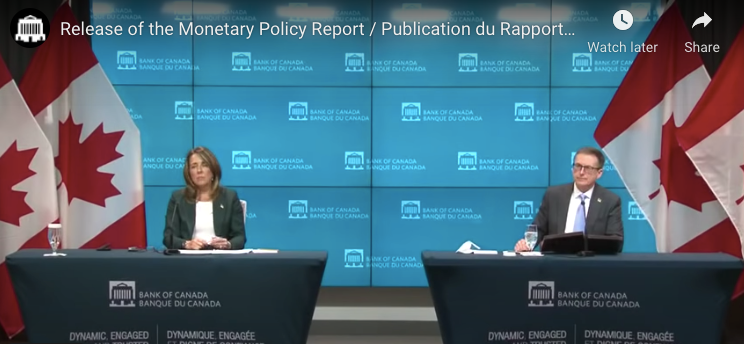Future Of Interest Rates (Part 1)


Hey!
Last week the Bank of Canada (BoC) doubled the central policy rate from 0.50% up to 1.00%. For context, January 1st 2022, the BoC policy rate rate was 0.25%.
This email is in two parts.
I’m reporting to you what interest rate indicators the BoC is signaling to the market and why. If you’re curious to understand what the future of interest rates might hold for Canada, continue reading …
Part 1 is the press release breakdown from governor of the BoC Tiff Macklem. This is the formal press release which is an executive summary of the monetary policy report.
Part 2 is a breakdown of the Q & A which I’m sending you next week. Reporters lob in questions for Tiff to knock out of the park …or does he? I think this is where things get a little juicy! Human emotion and nuance show up this section.
Let’s break down the Bank of Canada press conference and listen to what was said (forward guidance)!


Part 1: Press Release Breakdown:
The opening statement is broken down into three sections:
1. Canadian economy is strong.
2. Inflation is too high.
3. We need higher interest rates.
Canadian Economy Is Strong:
The BoC is seeing a broad set of positive economic indicators:
- Job growth is strong.
- Unemployment rate is record low.
- Job vacancies are elevated.
- Wage growth has reached pre-pandemic levels.
- Businesses continue to offer wage incentives to keep/attract talent.
That’s a rosie outlook!
Canadian spending is strong as the economy opens up. Although the Bank admits “higher interest rates should moderate growth in domestic spending as we move through this year and next“.
To offset this, the Bank is anticipating “robust business investment activity, improved labour productivity and immigration” to prop up GDP.
The BoC admits housing activity is expected to slow as interest rates rise, but still to remain at elevated levels.
Really?
I think the BoC is hoping housing activity remains at elevated levels (Nationally). The housing sector accounts for about 10% of Canada’s gross domestic product (GDP) that is made up from renovations, ownership transfers and commissions.
I think it’s reasonable that housing has an even larger influence on Canada’s GDP because of additional economic spinoffs like secondary/tertiary employment and other wealth spending effects.
I’m already seeing data from national news centre’s (CBC) that sales and prices are slightly down (from all time highs) in Ontario. Whether I like it or not, Ontario and B.C housing markets are the Real Estate engine of the country.
I think this is interesting …to the extent these housing markets decline might put Canada’s central bank policy makers in a tough position. I would hate the scenario to become keeping rates lower than wanted to stabilize housing, at the expense of allowing inflation to run high.
Locally, I think Calgary has many Real Estate tailwinds in the face of rising rates. Are you curious to know what I think? I write full monthly reports for you here.
Inflation Is Too High:
The primary mandate of the BoC is maintaining the 2% inflation target. And we have elevated inflation, for a long list of reasons.
What I find odd is the BoC mentioning, “Russia-Ukraine war has driven up the prices of energy and other commodities, and the war is further disrupting global supply chains“. Yet their is no mention of domestic policy decisions and how that has contributed to our current inflationary environment?
Moving on.
The BoC expects inflation to average almost 6% for the first half of 2022 and remain well above our 1-3% control range throughout this year.
The worry for the BoC is these elevated inflation numbers become entrenched with Canadians’ thinking. Another way to say this is, inflation becomes unanchored from the 2% target.
All of this leads to higher rates …
Higher Rates:
The BoC slapped the market with a 0.50% rate hike.
Why?
Raising the policy rate is the main tool the bank has to moderate demand, prevent a persistent build up of domestic price pressures, and keep inflation expectations moored to the 2% inflation target.
The mechanics of hiking rates to battle rising inflation are the A-B-C’s of monetary policy:
A) Higher rates cause Mortgage/HELOC loans, business loans and consumer loans to be more expensive to repay.
B) Higher rates increase savings interest rates.
C) A combination of higher borrowing costs plus improved savings rates lead to less spending in the economy which reduce consumer demand.
The A-B-C’s of raising interest rates also helps to keep inflation expectations anchored to the 2% target.
I think it’s fair to say the Bank of Canada forcefully lowered interest rates at the onset of the pandemic.
As we leave pandemic era monetary policy behind, the BoC is committed to using the policy interest rate to return inflation to target and will do so forcefully if required.
I think that’s pretty tough talk. Don’t you? I think interest rates will rise as long as something does not “break” in the economy.
The policy risk here is rising rates too high, too quickly sending our economy into recession.
If I zoom out to a higher level of observation, pulling myself out of today’s very intense inflationary environment, I can imagine the Bank of Canada over tightening monetary policy in their attempt to control inflation.
It restrictive monetary policy was in existence, I can see inflationary pressure easing, plus additional economic hardship surface in Canada. At that time, the BoC would likely lower interest rates with the hope of balancing the economy.
Conclusion:
There you have it! The ingredients for rising interest rates are prepped and ready for baking which are a) strong economic indicators, b) high inflation and c) the need for emergency rates has sub-subsided.
How high will rates rise? According to the “market” another 1.00% – 2.00%. What bank economist rarely forecast is the negative results from rising rates.
Look around. Do you ever see the BoC, RBC, CIBC economists publish a press release predicting a recession? But recessions do happen. I like to keep this top of mind as I think rates will rise as long as something doesn’t “break” in our economy.
Part 2 of my Bank of Canada monetary policy announcement is coming next week. This is where I’ll review some questions from the press and answers from the governor and senior governor of the Bank of Canada.
If you have a Mortgage question, or any Real Estate related need, let me know!
Cheers,
Chad Moore
P.S.
I rode my bike to work Tuesday morning. I tucked tail and got a ride home though, haha. Ahhh, April in Calgary :-). #snow
P.P.S.
If you’re on LinkedIn, let’s connect. I’m sharing content/data there as well. Link below.
Recent Posts
Calgary Market Update—March 2025 Data
Here are some Calgary Real Estate numbers, across all property types, out of the gate for…
Interest Rates Up Or Down?
Hey Guys! Tariffs are here. Now what? Tiff Macklem, governor of the Bank of Canada, gave…
Bank of Canada Hot Mic Moment
Hey Guys! The Bank of Canada publishes "meeting deliberation notes" relating to the discussion of raising,…
Banker’s Damaging Admission
When the governor of the Bank of Canada speaks, we listen! Tiff Macklem, governor at…
January 2025 Market Stats
Let's look back at January 2025 Calgary Real Estate Board (CREB) data to make sense…
Mortgage Interest Rate Review
Hey Guys! Here's an example of how the Bank of Canada is in a balance…


